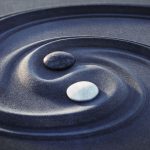If you have tried acupuncture before, or have seen a doctor or therapist who practises Traditional Chinese Medicine (TCM), you have likely heard the term “Qi”.
Qi, pronounced “Chee”, is the most critical component of traditional Chinese medicine, and arguably what the entire acupuncture therapy evolves around.
What is Qi?
The majority of cultural traditions and practices identify Qi as vital energy that circulates through the body at all times. Everything in the world is made up of Qi, including the physical body and all the feelings that people have.
Within different cultures, Qi has different names. The Greeks call it Pneuma, Indians call it Prana, and the Chinese call it Qi, although they are all the same concept.
Dr. Jill Blakeway, a doctor of acupuncture and Chinese medicine, explains Qi as:
“Chinese philosophy calls this vital energy Qi and describes it as the body’s innate intelligence — the intangible yet measurable way we maintain what’s known as homeostasis, or the body’s ability to regulate its internal environment to create good health”
Qi Deficiency
To live a happy, healthy and balanced life, those who believe in Traditional Chinese Medicine conclude that a person has to have a stable balance of Qi. Without this, illnesses, diseases and health conditions manifest and present themselves.
How can you tell that you’ve got enough Qi?
In Chinese medicine, a Qi deficiency can take many forms. People who have enough Qi are seen as energetic and healthy: they can easily fight off a virus or bounce back after an injury. Their bodies work as they should, with a smooth digestion process, immunity, and a clear state of mind.
Dr Jill Blakeway states “People with a healthy amount of Qi feel as if they have enough energy to meet their body’s needs. They sleep well, wake rested, and can complete their daily tasks.”
To put it simply, those who do not have enough Qi within their bodies will have low energy and feel fatigued. They may feel their systems and organs aren’t working as they should and could be suffering from a range of symptoms, such as: catching colds easily, anaemia, no appetite, difficulty digesting food, shortness of breath, no desire to talk, a weak pulse and depression.
In a nutshell, anytime you’re dealing with a medical problem, it is likely your Qi is out of balance.
If you have an ongoing medical condition, or simply don’t feel 100% yourself, it is worth considering your Qi balance. Here at Meraki, we would love to work alongside you in your journey to optimal health, contact us today to find out how we can help!



